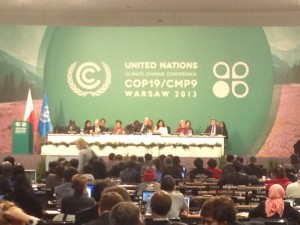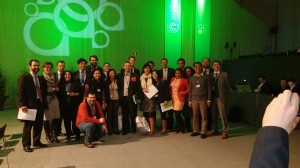We have much more to do and your continued support is needed now more than ever.
COP 19 Update: Delivering the Message
This weekend marked the official end of the 19th Conference of the Parties to the United Nations Framework Convention on Climate Change. Governments have agreed on a text after working through Friday night and into midday Saturday. Civil society spread its message, and National Wildlife Federation’s primary focus—Reducing Emissions from Deforestation and Forest Degradation—finished negotiations on time and with a positive note.

First, there are the negotiations as a whole, and the decisions made here will affect the United States and NWF’s domestic work. The decisions send signals to business, investors and funders back home on whether the U.S. and the rest of the world can expect action on carbon pollution, and a weak agreement will mean that nations, industry and organizations will have to work without a proper guidance framework.
Second is the development and success of our focused work on REDD, and why it relates to NWF’s tropical forests and agriculture program.
Governments did not come to an agreement that sufficiently addresses the danger climate change presents. While agreements on certain aspects—such as helping developing countries cope with adverse effects of climate change—seem to show that there is recognition of a problem and action needed to address it, no hard timeline has been set for bringing forth finance commitments or how ambitious pre-2020 emissions reduction commitments should be.
As I leave Warsaw, I can say that the process has been mostly frustrating, but at times inspiring. I’ve seen somewhat ambitious texts on a new climate agreement get flattened, and nations whose sole aim was to block negotiation progress. But I’ve also seen my NWF coworkers literally run down the halls to help their colleagues from other organizations, and vice versa, and I received incredible support from the Climate Action Network, of which NWF is a member.
The United States is normally singled out for its inaction in these talks, but this year was different. A combination of domestic action based on President Obama’s Climate Action Plan, efforts to move negotiations forward and the sheer horror of other countries backtracking on their commitments made the U.S. look mostly benign. There are still plenty of areas where the U.S. needs improvement, but there was a sense that times may be changing for America’s stance on climate change.

Speaking of walk-outs, over 800 NGO members walked out of the stadium on Thursday and handed in their badges, fed up with the lack of progress being made in Warsaw. NWF was not a part of this, and we instead stayed back, in the belief that we could achieve more inside the building than out, and called for more action from governments. This included a speech given by yours truly at a joint high-level plenary (click on my name in the frame to the right, or fast forward to the 28 minute mark).
After all, if we’re going to address the climate crisis, we need to act immediately.




















